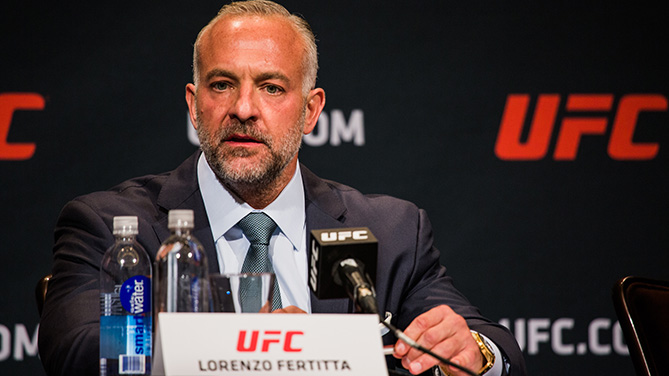
Announcements
UFC promises stricter punishments for PED cheats

UFC executives Lorenzo Fertitta, Dana White and Lawrence Epstein addressed the media and answered questions on Wednesday about the current state of performance-enhancing drug use in the UFC and mixed martial arts, strongly pledging the UFC’s commitment to “an even playing field” in the sport and promising a multi-million dollar commitment to enhanced year-round in- and out-of competition drug testing worldwide.
The UFC is planning to implement a more robust out-of-competition PED testing policy effective July 1, 2015. According to Fertitta, the UFC is currently in talks with reputable global testing organizations to create random drug testing protocol for approximately 585 UFC fighters, all of whom will all be subject to testing using World Anti-Doping Administration (WADA) standards.
The recent spate of positive tests, including Anderson Silva’s out-of-competition and post-fight failed tests for steroids, prompted Fertitta and White to expedite their efforts toward a more robust and diligent drug policy.
“We’ve been working on this for a long time,” Fertitta said. “What the Anderson Silva thing has done is prompted us to speed up the process. We don’t have the luxury to be academic and debate all these legal points. We’re going to make sure fighters are being tested.”
> WATCH: UFC Press Event Feb. 18, 2015
 PED use in MMA has been a problem for some time, Fertitta said, and the UFC has been dedicated to making strides in deterring and punishing its fighters over the past year. The company has spent about $500,000 on tests over the course of 2013-14.
PED use in MMA has been a problem for some time, Fertitta said, and the UFC has been dedicated to making strides in deterring and punishing its fighters over the past year. The company has spent about $500,000 on tests over the course of 2013-14.
Fertitta said that the UFC is committing several million dollars for in- and out-of-competition and random PED testing annually going forward to begin to eradicate PED use from the sport.
“Today marks a continuation of our call-to-action to combat the use of PEDs,” said Fertitta, speaking to a group of worldwide media assembled at Red Rock Resort Casino. "It is our belief that this plan will drive us to make our sport safer by allowing all of our athletes to compete on an even playing field. By doing so, we will not only be a leader in mixed martial arts, but also in the world of professional sports.”
> READ: UFC Press Event Transcript
Fertitta emphasized that the UFC is “extremely disappointed” with the recent string of failed drug tests by its athletes.
White said that there are a lot of myths and misconceptions in the media as it pertains to the recent tests. He used the Jon Jones and Silva cases as the prime examples.
“Jon Jones was tested out-of-competition on Dec. 4 (and) he tested positive for cocaine,” White said. “He was then again tested on Dec. 18. He was negative for PEDs. For people who don’t understand: The way that WADA (World Anti-Doping Agency) works is, you do not test for recreational drugs out-of-competition. Out-of-competition, you do not test for recreational drugs.”
Jones was again tested on Jan. 2 post-fight and he tested negative for both PEDs and recreational drugs, White said. Recreational drugs are not banned out-of-competition, thus Jones' penalty wasn’t as harsh as it would have been had he tested positive on his in-competition test.
“Had Jon Jones tested positive for recreational drugs after the fight, he would be in even more trouble,” White said. “He was fined $25,000 for violating the (UFC) code of conduct, and that money ended up being donated to a charity that benefits children impacted by drug use.”
 Both Fertitta and White are waiting for Silva to receive due process when it comes to his two failed drug tests. The former UFC middleweight champion is expected to appear at a NSAC hearing sometime in March to give his side of the story.
Both Fertitta and White are waiting for Silva to receive due process when it comes to his two failed drug tests. The former UFC middleweight champion is expected to appear at a NSAC hearing sometime in March to give his side of the story.
Until that time the UFC has decided to support Silva for his years of positive representation of the UFC and the sport.
Silva’s first failed test was out-of-competition and was administered on Jan. 9. The results of that test, which was taken by the Sports Medicine & Research Testing Laboratory in Salt Lake City, weren’t received by the NSAC until Feb. 3, which was after Silva’s UFC 183 victory over Nick Diaz.
There was concern expressed by the media and fans about the lapse of time between the failed test and when the results were received. But White explained that the UFC had no control of the timetable.
“That test did not come back until after the fight, and that is when we were notified,” White said. “First of all, the Nevada Athletic Commission would never let a fighter go in if they knew he was on performance-enhancing drugs. And we would never do that. No fight, or no one fighter, is worth the integrity of this sport. It would never happen. This test came back after the fact.”
White went on to say that the delay is an issue, and the UFC recognizes that and is working diligently to improve things on its end and advocate for better procedures.
This story was updated at 2:30 p.m. and 4:45 p.m. on 2/18/15


